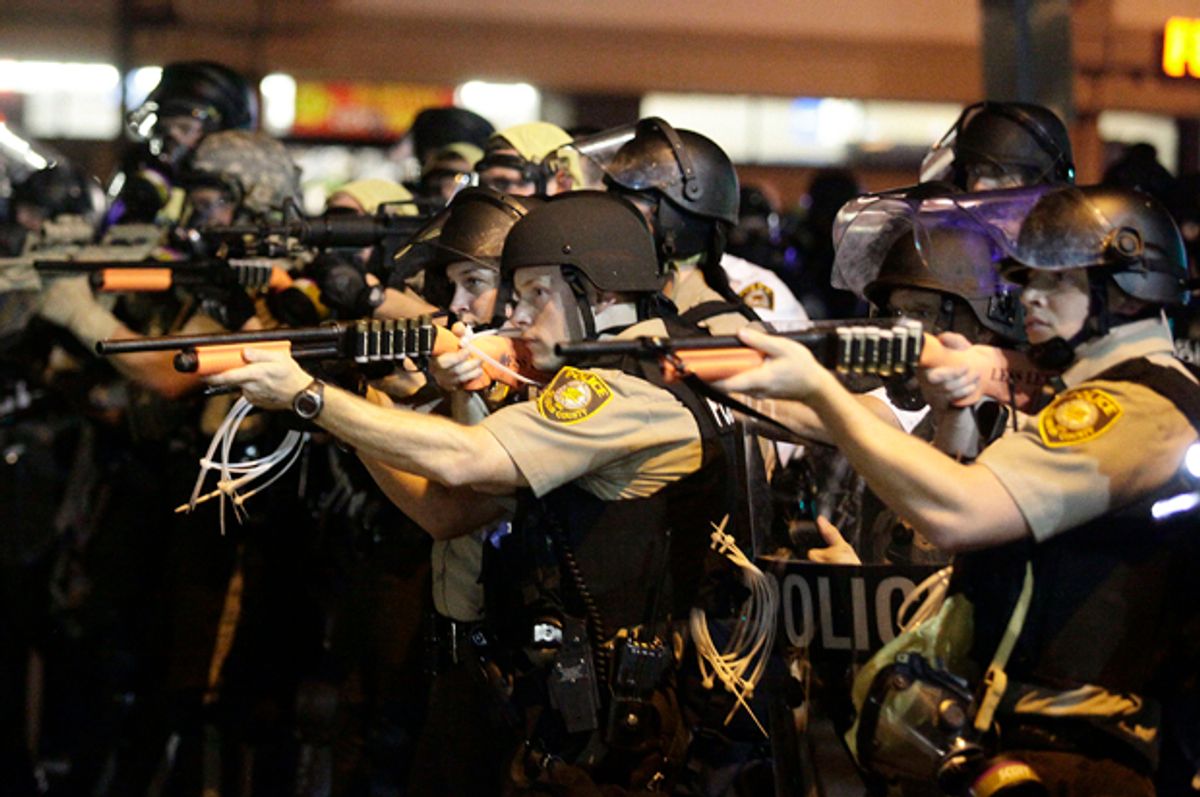The shooting of teenager Michael Brown has focused the nation (again) on the dangers faced by young, unarmed black men walking the streets of America. The sight of paramilitary police with guns pointed at peaceful protesters in a suburban town in the Midwest also got our attention. And as we wait for the legal system to determine if officer Darren Wilson will be held liable for the shooting, new questions are rising to the surface about the issue of officer-involved shootings in general. How often does this happen? How are these issues normally handled by prosecutors and the courts? And surprisingly, there is almost no way of knowing how often American citizens are killed at the hands of the authorities.
Most reporting in the last couple of weeks has cited the figure of 400 people killed in incidents of "justifiable homicide" by police officers each year since 2008. This number comes from estimates done by the Centers for Disease Control and the Bureau of Justice Statistics. According to this article by Reuben Fischer-Baum at Five Thirty Eight, that number is highly debatable for many reasons, not the least of which is the fact that only "justifiable" homicides are counted, which obviously means any that are deemed unjustified are not. It's clear that the current government methods for reporting these deaths are unreliable.
Others have tried to compile these statistics themselves through media reports. Kyle Wagner at Deadspin recently announced a crowdsourcing project to collect the information for a comprehensive database. D. Brian Burghart, editor of the Reno News & Review, has been trying to gather the data for years and wrote a very interesting, and disturbing, article for Gawker discussing the difficulties he's had getting cooperation from the authorities:
The biggest thing I've taken away from this project is something I'll never be able to prove, but I'm convinced to my core: The lack of such a database is intentional. No government—not the federal government, and not the thousands of municipalities that give their police forces license to use deadly force—wants you to know how many people it kills and why.
It's the only conclusion that can be drawn from the evidence. What evidence? In attempting to collect this information, I was lied to and delayed by the FBI, even when I was only trying to find out the addresses of police departments to make public records requests. The government collects millions of bits of data annually about law enforcement in its Uniform Crime Report, but it doesn't collect information about the most consequential act a law enforcer can do.
It does seem more than a bit odd that the government has the capacity to collect all emails and texts that pass through the United States but is unable to compile a list of citizens who died in interactions with police agencies, doesn't it?
There is also some curious legislative history on this subject. In 2000 Congress passed a bill called the Death in Custody Reporting Act with bipartisan support. According to its primary sponsor, Rep. Bobby Scott, it was designed to provide oversight over law enforcement during detention, arrest and imprisonment. Unfortunately, it expired in 2006 and despite Scott's best efforts it hasn't been renewed. It passed the House in 2009 and 2011 with overwhelming bipartisan support but went nowhere in the Senate each time. In 2011 it was actually sent to the full Senate but ran out of time before it was considered. It passed the House again in December of 2013, once more with bipartisan support. (How often does that happen in this Congress?) Since then it's been sitting in the Senate where it seems to be waiting to die once again. If it doesn't pass by the time Congress adjourns this fall it will have to start all over again.
Its main focus was the high incidence of death in jails and prisons under suspicious circumstances, but it set up a formal system of reporting deaths at the hands of police authorities among federal, state and local police agencies and tasked the attorney general with the job of analyzing the data and reporting on it. Its language is very simple:
Requires the head of each federal law enforcement agency to report to the Attorney General annually certain information regarding the death of any person who: (1) is detained or arrested by any officer of such agency (or by any state or local law enforcement officer for purposes of a federal law enforcement operation); or (2) is en route to be incarcerated or detained, or is incarcerated or detained, at any federal correctional facility or federal pretrial detention facility located within the United States or any other facility pursuant to a contract with or used by such agency.
Requires the Attorney General to study such information and report on means by which it can be used to reduce the number of such deaths.
The NAACP sent out an action alert last week urging its members to contact their senators and push them to pass this bill before they adjourn. Perhaps Harry Reid could also be prevailed upon to put this at the top of the agenda. It's just sitting there waiting to be voted upon and there's little reason to believe it won't.
The history of the legislation may not prove a political conspiracy but at the very least it shows what a low priority this has been. While lawmakers have been eager to provide funding for Homeland Security programs that provide grants to local and state authorities for paramilitary gear and equipment, there seems to be little appetite for insisting on oversight and transparency. And the combination of those two elements is proving deadly.
It's estimated that we have more than 17,000 different police agencies in the country. That's a lot of cops with a lot of guns. The least our government can do is try to keep track of how many people are dying in altercations with them.

Shares